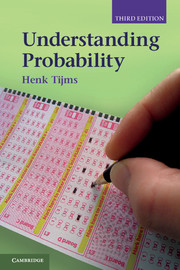Book contents
- Frontmatter
- Contents
- Preface
- Introduction
- PART ONE PROBABILITY IN ACTION
- 1 Probability questions
- 2 Law of large numbers and simulation
- 3 Probabilities in everyday life
- 4 Rare events and lotteries
- 5 Probability and statistics
- 6 Chance trees and Bayes' rule
- PART TWO ESSENTIALS OF PROBABILITY
- Appendix: Counting methods and ex
- Recommended reading
- Answers to odd-numbered problems
- Bibliography
- Index
4 - Rare events and lotteries
Published online by Cambridge University Press: 05 August 2012
- Frontmatter
- Contents
- Preface
- Introduction
- PART ONE PROBABILITY IN ACTION
- 1 Probability questions
- 2 Law of large numbers and simulation
- 3 Probabilities in everyday life
- 4 Rare events and lotteries
- 5 Probability and statistics
- 6 Chance trees and Bayes' rule
- PART TWO ESSENTIALS OF PROBABILITY
- Appendix: Counting methods and ex
- Recommended reading
- Answers to odd-numbered problems
- Bibliography
- Index
Summary
How does one calculate the probability of throwing heads more than fifteen times in 25 tosses of a fair coin? What is the probability of winning a lottery prize? Is it exceptional for a city that averages eight serious fires per year to experience twelve serious fires in one particular year? These kinds of questions can be answered by the probability distributions that we will be looking at in this chapter. These are the binomial distribution, the Poisson distribution and the hypergeometric distribution. A basic knowledge of these distributions is essential in the study of probability theory. This chapter gives insight into the different types of problems to which these probability distributions can be applied. The binomial model refers to a series of independent trials of an experiment that has two possible outcomes. Such an elementary experiment is also known as a Bernoulli experiment, after the famous Swiss mathematician Jakob Bernoulli (1654–1705). Inmost cases, the two possible outcomes of a Bernoulli experiment will be specified as “success” or “failure.” Many probability problems boil down to determining the probability distribution of the total number of successes in a series of independent trials of a Bernoulli experiment. The Poisson distribution is another important distribution and is used, in particular, to model the occurrence of rare events. When you know the expected value of a Poisson distribution, you know enough to calculate all of the probabilities of that distribution.
- Type
- Chapter
- Information
- Understanding Probability , pp. 108 - 141Publisher: Cambridge University PressPrint publication year: 2012



